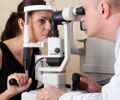Cataract surgery rates have soared 10-fold over the past 40 years in England, owing to changes in practice and a government push to boost supply
Cataract surgery rates have soared 10-fold over the past 40 years in England, owing to changes in practice and a government push to boost supply, finds research published ahead of print in the British Journal of Ophthalmology.
But the huge increase and wide geographical variation in rates suggest that the NHS is now oversupplied with the procedure, which has implications for funding and training, say the authors.The research team analysed national data on hospital admissions for cataract surgery in England from 1968 to 2004. They also looked at similar data for the former regional health authority area of Oxford.
The analysis of the national data showed that cataract surgery rates rose 10-fold between 1968 and 2004.
Both national and regional data showed a five-fold increase from the late 1980s to 2003.
Admission rates in England rose from 62 per 100,000 of the population in 1968, to 173 in 1989, and then to 637 in 2004. The increases occurred in every age group.
Analysis by area showed wide geographical variation in admissions, ranging from 172 to 548 people per 100,000 of the population, depending on location. The highest rates tended to be in more deprived areas.
Advertisement
The push to provide more cataract surgery was kick-started in the 1990s when eye and public health doctors predicted a major shortfall in provision, made worse by an ageing population.
“The fact that cataract surgery has increased so much in recent years raises questions as to whether it is now undertaken too readily in some cases, and whether the long backlogs of clinical need are still being cleared,” they say.
They suggest that England should learn from New Zealand, where patients are prioritised according to clinical need rather than the availability of surgeons or waiting time targets.
“…the possibility of overcapacity in England would have profound financial implications for the commissioning of surgery by primary care trusts, and for professional training,” they conclude.
Source-BMJ
LIN/V









